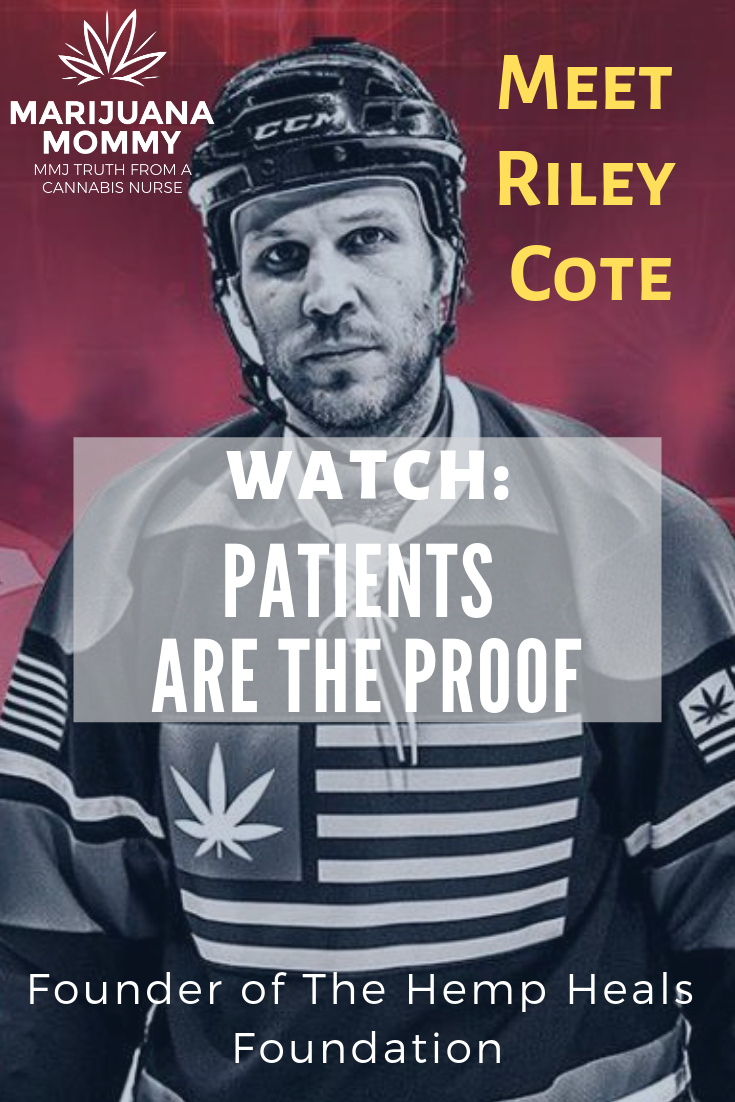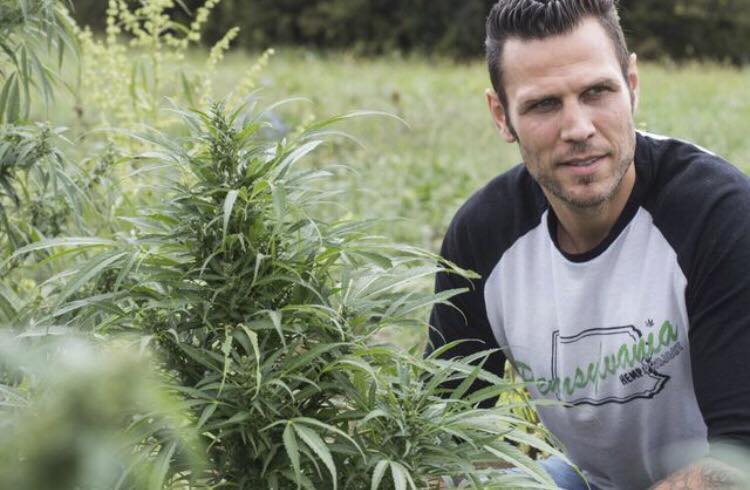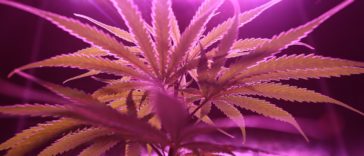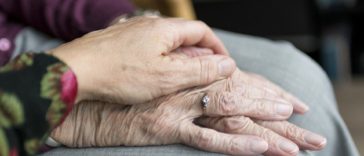This website is informational and cannot diagnose or treat illness or disease. Medical marijuana should be used under the direction of a licensed healthcare provider. This site contains advertisements. If you click a link and make a purchase, MarijuanaMommy.com may receive a commission.
Pro-Athletes are Swarming to Cannabis
NFL Hall of Famer, Joe Montana recently announced his entrance into the cannabis industry. This month, the NHL Alumni Association announced a research partnership with the Canadian cannabis company, Canopy Growth. Meanwhile, retired athletes like Riley Cote, Todd Herremans, and Scott Parker are merging their sports expertise with cannabis. Retired pro-athletes are swarming to the industry, with CBD brands and dispensaries popping up under the banners of former sports-stars.
As retired Philadelphia Flyers player, Riley Cote, explained, “It’s been interesting. Cannabis and sports, 5-10 years ago, couldn’t coexist in the same sentence and now it’s looked upon as the ultimate recovery tool.” When it comes to cannabis, Cote is more than just talk. Since his retirement as a defenseman from the Philadelphia Flyers, he’s become an outspoken advocate. Cote founded the Hemp Heals Foundation, an organization that “supports sustainable agriculture, sustainable health and clean natural medicine, while focusing on a holistic approach to optimum health.”
There’s no denying that cannabis can be a remarkable recovery tool. It offers significant symptom relief from the many ailments endured by retired pro-athletes. And retired athletes DO face many health challenges. Yet, for many retired athletes, cannabis can offer more than healing.
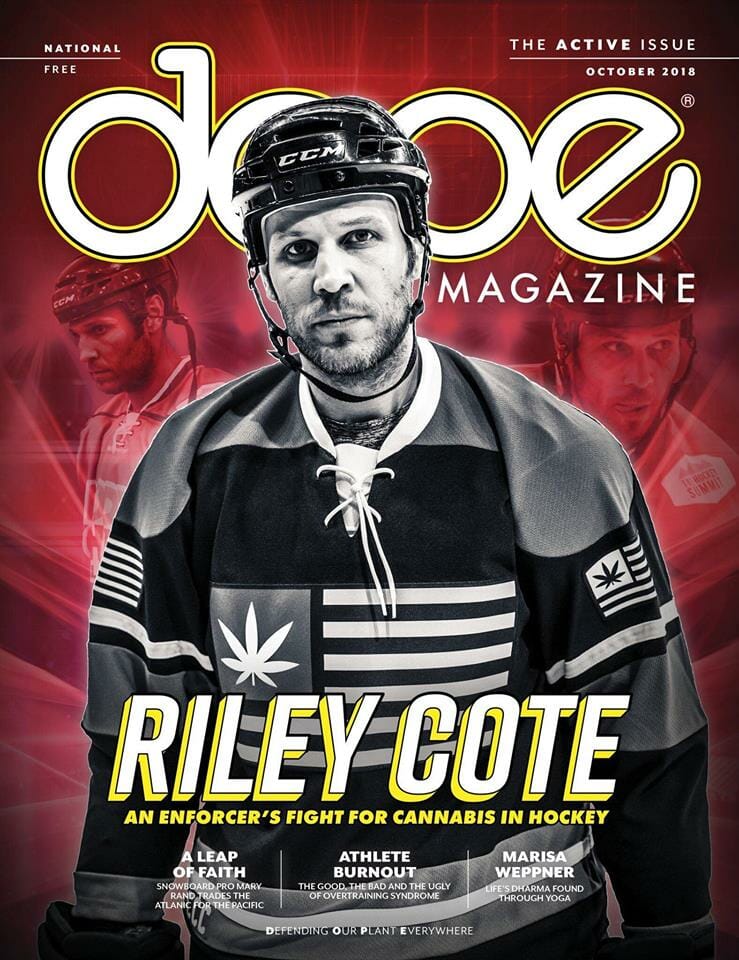
It’s More Than Just Health. It’s Hope.
A study published in the Clinical Journal of Sport Medicine showed 26.2% of retired NFL players required the continued use of opiates after leaving the sport. While, a study published in Injury Prevention, a British Medical Journal, showed the NHL loses hundreds-of-millions of dollars because of player injuries. And with the long-term effects of head trauma, the statistics are downright alarming. In fact, they’re so alarming, that both the NHL and NFL have settled in litigation, awarding monetary settlements to thousands of former players.
Clearly, pro-sports players have an elevated risk for long-term health issues as a result of their career, so it’s not surprising an increasing number of athletes are turning to medical marijuana to enhance their wellness. But as Cote, who serves as the NHL ambassador for Athletes for CARE points out, retired athletes frequently face physical ailments, mental health issues, and addiction issues after transitioning away from their sport.
On top of that, many retired players, “struggle with who they are.” Cote further explains, until retirement “everyone kind of knows you for what you did–your job–your whole life, and all of a sudden, you’re not that anymore. You’re kind of like–a has been–it was like, that was in the past.”
It may be this newfound “lack of purpose” that makes the cannabis industry so appealing to retired athletes. “It’s something to grab on to,” said Cote, who co-founded the hemp line, BodyChek Wellness. He encourages athletes to think of cannabis, “not just as a healing mechanism for them to deal with their issues, but also as a business opportunity.”
Cote adds, “This is all for the greater good of all people. So why not hop on the band wagon and be a part of it in some capacity? Use your skill set…it doesn’t matter what you’re good at, you can kind of intersect that with the cannabis space and healing.”
For many retired athletes, cannabis offers more than just a way to achieve health and wellness, it offers hope and the glimmer of a new purpose.
READ: So, You’re Thinking of Trying Cannabis?
Watch my interview with Riley Cote or read the transcript below.
Riley Cote Bio:
Riley is a former NHL hockey player, who spent four seasons with the Philadelphia Flyers where he was known as an enforcer. After retiring, Riley founded the Hemp Heals Foundation, a 501c3 nonprofit organization dedicated to promoting hemp as a viable renewable resource. Riley is co-founder of BodyChek Wellness and also sits on the Pennsylvania Hemp Industries Council board. His role as the NHL League ambassador for Athletes for Care, allows him to continue pursuing his passion to help athletes find safe, nontoxic ways to attain, release, and manage pain and guide them to self healing.
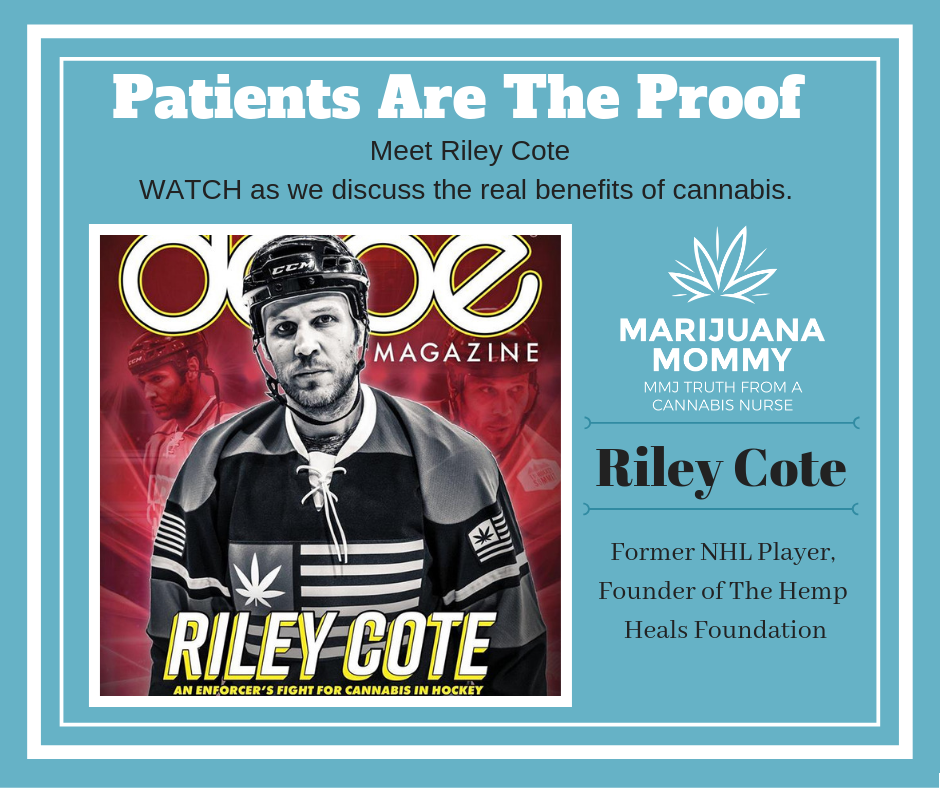
TRANSCRIPT (edited for clarity):
Jessie Gill, RN: 00:07 I am Jessie, a cannabis nurse and the founder of Marijuana Mommy and you’re watching Patients are the Proof, where we talk about the real health benefits of cannabis.
Jessie Gill, RN: 00:15 Today I’m talking with Riley Cote. Riley is a former NHL hockey player, who spent four seasons with the Philadelphia Flyers where he was known as an enforcer. After retiring, Riley founded the Hemp Heals Foundation, a 501c3 nonprofit organization dedicated to promoting hemp as a viable renewable resource. Riley also sits on the Pennsylvania Hemp Industries Council board and his role as the NHL League ambassador for Athletes for Care, allows him to continue pursuing his passion to help athletes find safe, nontoxic ways to attain, release, and manage pain and guide them to self healing.
Riley Cote: 00:56 Well said.
Jessie Gill, RN: 00:58 Riley, thank you so much for talking to me this morning. I really appreciate it. Thanks for having me. I am a hockey mom. My 11 year old plays ice hockey, so I’m very thrilled to chat with you. I’d love to hear a little bit about how you got involved in the hemp & cannabis industry. How did, how did you go from the NHL to hemp?
Riley Cote: 01:22 Well I think it stems back earlier in my life. I had a relationship with cannabis since I was 15 years old, early on, not really understanding it, in a very recreational setting most of the time. And then I think as I turned into the professional ranks and started fighting, within the hockey game, I started realizing the therapeutic and medicinal values. So I, you know, I think I had a pretty good grasp on cannabis. Just at least from the way it made me feel. It increases my quality of life and help with anxiety and sleep. But then as I retired in 2010, at the age of 28, I really kind of started learning about the entire cannabis plant, you know, more from an industrial hemp side. I looked at it as a super food and learned about the nutritional profile and the hemp seed and started transitioning from animal proteins to plant based proteins and then started just learning more about the rest of the plant. The textiles, the history of hemp and cannabis, you know, learning about prohibition. And then as I started learning about this, I guess, I became extremely passionate about this other side of cannabis and started dipping my head down the rabbit holes of science, learning about THC and the discovery of it and then start learning about non psychoactive cannabinoids and everything kind of just made sense, you know. And then, in 2013 or so, I started getting into the CBD oil and it was kind of pre-2014 farm bill when the CBD products kind of came on the scene and exploded. So I started using those mindfully to kind of prevent and mitigate some of the damage caused or, I might have caused, through my hockey career and fighting specifically.
Riley Cote: 03:06 So, doing all those things, it just kind of, it made sense to stand up for it to be an advocate. I started the Hemp Heals Foundation that was really mainly kind of the umbrella of cannabis, showing all the different versatile uses of cannabis and hemp, not just the medicine or the recreational side. Then that eventually kind of evolved. As I started speaking publicly, it was evolved more into using my sports platform and background to, promote cannabis as a wellness tool and just normalizing cannabinoids through sports. And it was really kind of taking off and it’s been interesting. Cannabis and sports 5-10 years ago couldn’t coexist in the same sentence and now it’s looked upon as the ultimate recovery tool. So interesting times for sure.
Jessie Gill, RN: 03:53 It’s amazing. And you have a great point there. Our sports players and really, really need the access to this plant. From what I’ve read, the NHL has–they’re not really too receptive of cannabis, as a medicine, but they’re not as restrictive as many of the other professional sports. What was your experience like with using cannabis in the NHL? Did you, were you actively using while you were playing?
Riley Cote: 04:21 I was, yeah. And I’ve been actively, I was actively using cannabis since I was 15 years old through junior hockey, all through all the way through the minor league ranks, and then in the NHL as well. In the NHL we did get tested three to four times a year. And, we got maybe a 24 hour notice on it, but I would have tested positive every single time. It was the risk I ran because I knew the drug test was — if you tested positive, it had to be really, really high amounts of THC, but what they were looking for was other street drugs on that side of the drug test. And then on the other side is performance enhancing drugs and which cannabis isn’t, it’s just a banned substance. So, I don’t know anybody that’s really ever been thrown into the substance abuse program for strictly THC. It’s usually a combination of other street drugs or alcohol if they do go that way.
Riley Cote: 05:10 But as far as the guy getting a test positive for Thc, it doesn’t happen. You know what I mean? It has to be such a high amount that you have to, you’d literally have to ingest 1000 milligrams at once. You know what I mean?
Jessie Gill, RN: 05:22 It’s way too much.
Riley Cote: 05:24 Yeah, way too much. I think they do that on purpose because, they KNOW, but they can’t “not test” because it’s still federally illegal in the US and it’s an international sport. There’s a lot of politics and there’s a lot of liability involved in that. For them, they probably see the benefits and probably within teams and organizations, they’re probably doing it quietly, but they’re not allowing their players to legally, because it’s complicated. It’s federally illegal in the US, you can’t just say north of the border, it’s fair game and then south of the border,, you’e on opiates and sleeping pills. It sounds crazy, but it is crazy. It is crazy that in this day and age, we’re fighting for something as simple as cannabis. Where on the other side of it, we’re giving people synthetic heroin and sleeping pills and muscle relaxers and all these different things to manage the very things that we can be managing with cannabis. So we have a lot of work to be done. You look at Canada, with a 12 year medical cannabis program? Now they’re gone full rec. But most people don’t understand it. You know, most Canadians didn’t even know there was a medical cannabis program, you know, it’s not advertised. The science isn’t promoted.
Jessie Gill, RN: 06:44 Yeah, I was surprised when I, when I heard the numbers of people that were in Canada’s program at medical program, it seems very low.
Riley Cote: 06:52 Yeah, it’s very low. And again, most doctors wouldn’t even bring it up in a consultation. You have to bring it up. It’s not advertised. As, you know, cannabis isn’t the first line of defense. It’s a reactionary medicine–the last resort almost. We need to change that model, to me, cannabis is preventative. It’s being proactive. It’s all a good things on the front end of it. We don’t have to get so sick to use cannabis and feel guilty doing it. I think we need a to lose that thinking. We need to be more proactive with our health and if we can remove some of these ailments through managing our stress and anxiety and sleep, our pain and inflammation with a sustainable tool.
Riley Cote: 07:31 To me, a lot of these things down the road don’t manifest. Stress is a killer, anxiety manifest into depression. And if you don’t manage those things, negative things start happening. Cannabis is a tool. And I think that’s what needs to be clear too, is that it’s one tool in the toolbox. I mean, it needs to be in conjunction with other parts of wellness–meditation, Yoga–those things offer high anti-anxiety, and help with inflammation. Nutrition. Diet. I mean it’s like your diet can be inflammatory or anti-inflammatory. So, you know, we lean on the cannabis plant as kind of a substitute for Pharma, but I think the bigger picture is that cannabis can be introduced into a daily regimen that is far more sustainable than people that are living off of alcohol and caffeine, all these stimulants and these depressants, and all these things go up and down all day long just to cope, just to cope.
Riley Cote: 08:29 And I’ve seen it and I’ve lived it. It’s an interesting world we live in because, everyone wants to sell something to somebody and most of it is garbage. You look at the food industry and you look at the things that are legal, and people don’t think of them as a problem, because they’re legal. But you know, people are dependent on caffeine. People are dependent on alcohol, you know what I mean? And, there’s a lot of destruction that comes along with alcohol specifically. It’s a dark drug. It makes people do a lot of really bad things. Throughout history, cannabis has been called the gateway drug. And that couldn’t be further from the truth. I mean, it’s the gateway to wellness, but alcohol is the gateway drug. Cannabis as an exit drug. People get off opioids and alcoholism with cannabis. There’s so much for the mass public to understand, you know what I mean?
Riley Cote: 09:24 We haven’t even scratched the surface. This information isn’t coming on the CNN and Fox News of the world because, that’s not part of the agenda, you know what I mean?Part of the agenda is keeping people confused and unsure and trusting of the establishment and not going against it, or finding a better solution that’s natural. Yeah, exactly. That’s the current business model that we are engaged in right now.
Jessie Gill, RN: 09:54 Yeah, you’re totally speaking my language when you elaborate that people need, uh, you know, a whole lifestyle change, often. I say this all the time cannabis isn’t a magic bullet, it’s not going to magically fix people, but just like you said, it’s a tool to try to attain wellness. And a lot of times when people are suffering immensely, it gives them an opportunity to, like you said, to embrace meditation or Yoga and to get on the track of a healthy lifestyle, which can totally transform. And you mentioned how cannabis is protective and that’s absolutely amazing. It’s such an important aspect of the plant that a lot of people don’t realize. Do you feel like it was protective for you, for all your time in the NHL because you, you took a lot of hard hits?
Riley Cote: 10:41 Well, yeah. You know what? I honestly attribute my mental health now to using cannabis when I played and then when I retired I was still using it and mindfully using CBD oil. So I see a lot of guys that weren’t even in a fraction of the fights that I was in, and took not even nearly amount of the amount of head trauma that I’ve taken. Not that I’m being that like that and counting blows, I just know from the information and the studies that I read on cannabis as a neuroprotectant or cannabinoids as neuroprotectants. There’s gotta be something there. There has to be a correlation because you look at children with epilepsy and autism and you see the response–the cognitive response to CBD and some of these other phytocannabinoids. All the way through concussion, TBI, CTE–people getting great results from it, the ones that are mindfully doing it. And then all the way up to like Parkinson’s, dementia, Alzheimer’s, and those are all brain, you know, those are all brain diseases or disease states, and the cannabis is helping with it. So I can say, for guy’s a, I’ve looked around and seen struggling, who’ve left the game with a concussion and are in a really dark place. Cannabis is a very, very valuable a tool that can, again, get people kind of back on that right track to engage in other things that promote wellness. Some people really struggle with getting out of bed. If you can use something that can get you out of bed, well maybe you can maybe go walk a little bit further. Maybe you can do a mindful movement a little bit longer. So therefore you’re feeling better. Cannabis can be considered a crutch, you know, crutches help people walk and then when you can walk, you don’t need it anymore. You know what I mean? Some people can use it until they remove the pain or the anxiety. But some people, it’s forever. There are some disease states where you’re going to have to use it forever because the pain is so great and the inflammation is so real, and the sleep you’re struggling. You know what I mean? So to me there’s different spectrums of cannabis use and it needs to be respected just like any other substance. It is a substance, especially the THC, the psychoactive compound in cannabis.
Riley Cote: 12:59 People can over-consume a lot– easily– especially with edibles, You have to know what you’re doing, all cannabis isn’t the same. Five milligrams isn’t the same as 100 milligrams. That’s really important because you’d have a really bad experience. And I hear it all the time, “yeah, I got really anxious” or “I fell asleep”. It’s probably, because you overconsumed especially with THC. It doesn’t take much for people that don’t consume cannabis regularly, to over consume. Less is more. Go low and slow, everyone kind of says it. I mean it’s so true. Even me, after consuming cannabis for 21 years, it’s like I know my dose. You know what I mean? I know what I can do. I can consume throughout the day and be fully functional, creative, focused and clear. But I’m also not smoking like I was when I was 16 years old, with no intention or purpose, not understanding it. So, there is a huge understanding and an educational component that comes along with it. The dosing is key that changes your experience. Micro doses, if you can micro dose, and for people who are anti-THC, at least get into CBD. Like, it does change the game..
Jessie Gill, RN: 14:17 I microdose and it’s totally a game changer, absolutely. I mean, you can experience the benefits without those mind altering side effects. But I was the same way when I first became a patient. I was very reluctant for so many reasons, a lot of the stigma, but also I believed it made me anxious. I’m like, oh no, I’ve, tried marijuana, I know what it is. And I had a horrible anxiety attack and I can’t use it. But just like you said, I didn’t understand dosage and I also didn’t understand strains and all of the things that patients really need to learn about. You brought up a great point and this is, I think a lot of what your foundation does is, you know, besides the medical aspects, besides the health aspects, hemp and cannabis plants offer, so much opportunity and in a variety of industries. Can you speak a little bit about that?
Riley Cote: 15:07 Yeah, that’s a huge part of it. So Athletes for Cares, has got a bunch of different arms on it. The main was kind of like creating a locker room outside the locker room, like a support system for guys that are struggling. Part of it is not just physical injuries, or mental health issues, or addiction issues that guys struggle with. It’s kind of like a lack of purpose. It’s something to grab onto. And I think the cannabis space, especially on the medical side, when you’re dealing with patients and seeing how cannabis affects people in such a positive way, you realize the true nature of how healing this plant is, and it really does give so much opportunity if you believe in it enough and see it enough, you know what I mean?
Riley Cote: 15:50 So I think introducing the cannabis plant to guys, not just as a healing mechanism for them to deal with their issues, but also as a business opportunity. You know what I mean? And you’re getting into something you love and it’s always about about healing and giving back. Whether, it’s direct, to patients or doctors, or you’re just in the space of providing good medicine, or if you’re in the industrial hemp space and you’re a farmer, I mean, everything is good because it’s just so positive for the environment. It’s so positive for local economics and then public health. I mean, it’s so clear that this plant is healing. So, for us introducing this not just as a plant alternative to heal. But guess what, here’s a great opportunity and this is like the best time to be alive. You know, we’re living amongst, you know, some of the greatest times ever, and this is all for the greater good of all people. So why not hop on the band wagon and be a part of it in some capacity. Use Your skillset. I think the cannabis space overlaps into so many different skill sets. I mean, you’re, you’re a nurse. I mean, obviously at one point you, you didn’t use cannabis in your practice, you know, teaching, that was back in the toolbox and you can do your thing. Lawyers, creative arts–it doesn’t matter what you’re good at, you can kind of intersect that with that with the cannabis space and healing. Really, that’s a huge part of it. This identity and purpose too–guys struggle there’s so much ego in sports.
Jessie Gill, RN: 17:25 I can imagine after like retiring, it must be a really a whole different life. Like you know, a different lifestyle. It’s gotta be a big change.
Riley Cote: 17:34 Yeah, it really is. It really is. Because again, everyone kind of knows you for what you did, your job, your whole life, and all of a sudden you’re not that anymore. You’re kind of like a has been–it was like that was in the past. So guys struggle with who they are.
Riley Cote: 17:46 And I actually want to bring up a point on your last thing, the last thing you mentioned about the anxiety with THC. What I’ve learned too is that prohibition kind of did drive all the grows indoors, underground, right? So all these growers naturally we’re growing high THC strains, high THC, this, right? And naturally in nature the the hemp plant is kind of more balanced. It’s a little lower in THC, higher CBD. Um, so what happened was like this imbalance in the cannabis plant, high THC, low CBD, and this model has kind of transferred to the medical model. It’s not very natural and it’s not very balanced.
Riley Cote: 18:28 Um, so again, some patients even if it’s organically grown all these different things are great. Like guess what? Too much THC does have adverse side effects. Either consume less THC, or bring in more CBD to balance out what you’re consuming because there is this kind of misunderstanding of this whole plant. Naturally, when found in nature, there was so much more balance where you wouldn’t have these high, high, high amounts of THC where you’re like freaking out like 80% to 90% THC. You know what I mean? So yes, it’s created all these different delivery methods and, you know, extreme potent medicine for certain conditions. That’s great. But I think if you’re just going to consume it, thinking that you’re consuming the same exact stuff that nature provided without any side effects. I think that’s where people get really kind of lost in it and they’ll be like, wow, I thought, there’s people smoking all the time. How come I felt like that? Well guess what that was a was a lot of THC and no CBD to balance it.
Jessie Gill, RN: 19:34 That’s a good point. CBD is so, so, so important and I always encourage people to add at least, you know, one to one. But I do way more CBD than THC personally and I’ve noticed a massive difference in how I feel, my inflammation, and my anxiety levels. That’s an excellent, excellent point.
Riley Cote: 19:55 Yeah. Thanks. I think it’s, this is not talked about enough. I think the anxiety from cannabis comes up a lot more than I would like it to. And I’m just thinking, Geez, come on guys. Like this is supposed to be anti anxiety if you do it right. You know, I’ve been using my whole life because it calmed me down. You know what I mean? There’s certainly moments that I’ve freaked out because I overconsumed especially with edibles early on in my life, but, you know what I mean? Like that needs to be taught from within the medical cannabis programs. And it is touched on, but there’s not nearly enough to CBD in the medical cannabis programs in my opinion. It’s mostly purchases through industrial hemp, which is great. But I mean if you’re a dispensary, you better have a ton of CBD. Cause you know, that’s what people really are looking for. A lot of people don’t want the psychoactive nature of cannabis, you know? Especially as you get older.
Jessie Gill, RN: 20:48 It’s a good point also that CBD can kind of help counteract that THC induced anxiety and balance it out a little, which I don’t think people realize. But you’re right, the programs are severely lacking in high CBD strains. Like our New Jersey program here is really suffering right now from not enough cannabis overall, but I went to the dispensary the other day and there were no CBD strains at all, which is just
Riley Cote: 21:13 It’s just terrible.
Jessie Gill, RN: 21:13 Heartbreaking. Yeah. Really, really heartbreaking for people that depend on it. Thank God for hemp based and industrial hemp based CBD because at least there’s something out there that people can access. So what do you, what do you tell people when they obviously can benefit from a cannabis based medicine, but thye are super scared and reluctant? What would be your advice or words of encouragement to them?
Riley Cote: 21:39 Yeah, I mean generally the hangup is the THC, the psychoactive component, right? So that’s kind of always what’s been like dark around cannabis. So I just, I just say, well, guess what? You can consume cannabis products without that psychoactive effect that mimic kind of everyday products that we consume across the board, from capsules to tinctures to transdermal patches, to suppositories–the whole bit. So it mimics traditional medicine. There’s no psychoactivity. So what’s there’d be afraid of? And on the hemp side of things, you can say, well guess what? Hemp is legal now and, its federally legal in the US and, and this is just a derivative of, but it’s non-psychoactive. It’s gotta be grown below 0.3% THC. I think whenever anyone is hung up, it’s always the THC, that’s the hang up. So you know, if we can provide a solution without THC, that seems to be the angle that I’ve had success with.
Jessie Gill, RN: 22:34 Yeah, that’s great. Me too, it’s like get your toes wet with CBD, see how that does. And then, you know, a lot of times people need to add a little THC, but CBD is a great way to start.
Riley Cote: 22:45 Baby steps.
Jessie Gill, RN: 22:45 Where can people find you? Where can they connect with you?
Riley Cote: 22:48 Yeah, I’m on Twitter and Instagram at Riley Coyote, R. I. L E. E C O. Y. O. T. E. AthletesforCare.org. I have a CBD product line called BodyChek Wellness– BodyChek, C. H. E. K. at BodyChekwellness.com and then hemphealsfoundation.com. But, yeah, I’m around, I’m in the Philly area. My hub is Pennsylvania and Jersey, I guess you could say. And I travel abroad and just try and spread the good word as much as they can.
Jessie Gill, RN: 23:25 I appreciate it. I personally am very, very grateful for all you do and I know that so many patients everywhere are too, because we need voices like yours to, you know, really be heard so thank you.
Riley Cote: 23:38 Thank you. No problem. It’s the least I can do.
Jessie Gill, RN: 23:41 Awesome. It was so great talking to you this morning and I really, really appreciate your time. I’ll link to everything down below. Okay, sounds good. Thanks, Riley.Trending Now
